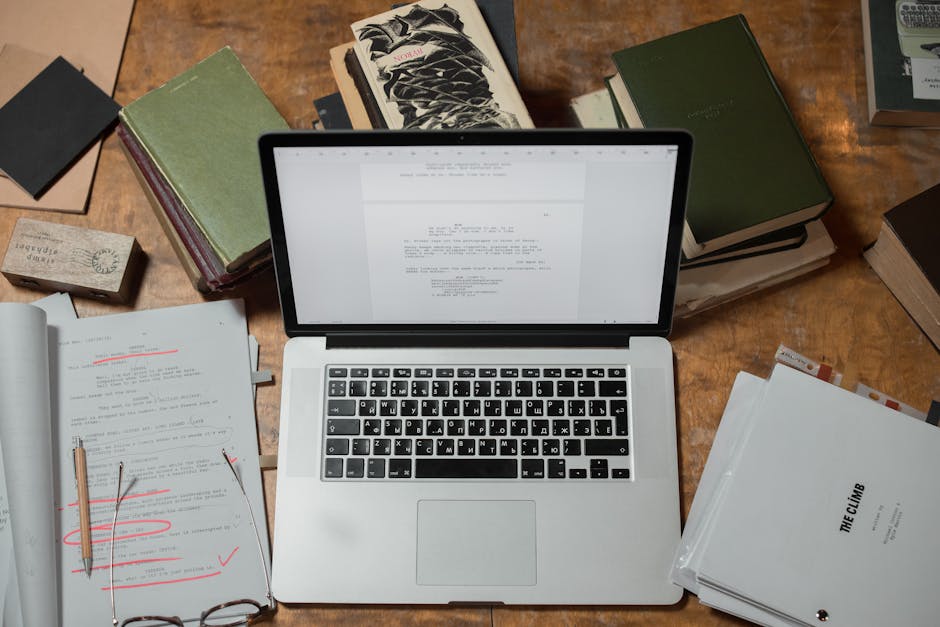Editing Your Script: A Crucial Step
Have you ever watched a movie or a play and thought, “Wow, that was amazing!”? Behind every great performance is a well-edited script. Editing your script is not just a final touch; it’s one of the most important steps in creating a compelling story. Lets dive into why editing matters and how to do it effectively.
Why is Script Editing Important?

Editing shapes your script into a polished piece of work. It helps you clarify your message, tighten your narrative, and enhance your characters. Without good editing, even the best ideas can get lost in messy writing.
Think about your favorite book or film. The pacing, dialogue, and plot twists all work together seamlessly. This is the result of careful editing. If you want your audience to be engaged from start to finish, editing is key.
What Should You Focus on When Editing?

Editing involves more than just fixing spelling mistakes. Here are some areas to focus on:
- Structure: Does your story flow logically? Check for pacing and coherence.
- Character Development: Are your characters well-rounded? Make sure they have depth and motivations.
- Dialogue: Is the dialogue natural? Ensure it sounds like real conversations.
- Theme: Does your script convey the intended message? Stay true to your story’s core.
Each of these elements plays a vital role in how your script is received. Lets look at them more closely.
How Do You Improve Structure?

A strong structure keeps your audience engaged. Think of your script like a roller coaster. It needs ups and downs to keep the thrill alive. Here are some tips to enhance your structure:
- Outline Your Script: Before diving into editing, create a simple outline. This helps you see the big picture.
- Check the Flow: Does each scene naturally lead to the next? If not, consider rearranging them.
- Pace Yourself: Ensure there’s a balance between action scenes and slower moments for reflection.
For example, if your protagonist is on a thrilling chase, follow it up with a quieter scene for character development. This pacing keeps the audience emotionally invested.
How Can You Strengthen Character Development?

Characters are the heart of your story. If they’re flat or unrelatable, readers may lose interest. Heres how to ensure your characters resonate:
- Backstory: Give your characters depth by providing a brief backstory. Why do they act the way they do?
- Motivation: Clearly define what your characters want. This drives their actions and decisions.
- Conflict: Introduce challenges that force your characters to grow. This keeps the audience rooting for them.
Consider a character who wants to become a musician. Show their struggles and triumphs, and let the audience witness their journey. This builds a connection.
How to Polish Dialogue?
Dialogue can make or break your script. It should feel natural and engaging. Heres how to enhance it:
- Read Aloud: Hearing the dialogue helps you catch awkward phrases. If it sounds strange spoken, it needs revision.
- Avoid Exposition: don’t dump information through dialogue. Let characters reveal details naturally.
- Vary Speech Patterns: Each character should have a unique voice. Consider their background and personality.
For instance, a quirky character might use humor, while a serious character might speak more formally. This adds layers to your script.
What About the Theme?
Your scripts theme is it’s underlying message. it’s what makes your story meaningful. To ensure clarity:
- Identify Your Theme: What do you want to convey? Write it down in one sentence.
- Reflect in Every Scene: Make sure each scene aligns with your theme. This creates a cohesive story.
- Show, don’t Tell: Instead of stating your theme outright, let it unfold through the story.
A great example is the theme of friendship in The Lion King. The story illustrates this through actions and events, rather than lengthy explanations.
How to Get an Objective Perspective?
Editing can be challenging because you’re emotionally attached to your work. Getting a fresh perspective is crucial. Heres how:
- Take a Break: After writing, set your script aside for a few days. This helps you return with fresh eyes.
- Ask for Feedback: Share your script with trusted friends or colleagues. They can spot issues you might miss.
- Consider Hiring a Professional: An editor can provide expert insights. They know what works in the industry.
Feedback can be tough to hear, but it’s essential for your growth as a writer. Embrace constructive criticism.
What Tools Can Help You Edit?
In todays digital age, there are many tools available to aid your editing process:
- Grammarly: This writing assistant checks for grammar and style issues.
- Hemingway Editor: This tool highlights complex sentences and suggests simpler alternatives.
- Celtx: A scriptwriting software that helps with formatting and organization.
Using these tools can streamline your editing process and enhance your scripts quality. they’re like having a second pair of eyes.
Common Editing Mistakes to Avoid
Every writer makes mistakes. Here are some common pitfalls to watch out for:
- Over-editing: Sometimes, less is more. don’t strip your script of it’s unique voice.
- Ignoring Feedback: If multiple people point out the same issue, chances are it’s a problem.
- Skipping the Final Read: Always do a final read-through before submitting your script. It can catch last-minute errors.
Being aware of these mistakes can save you time and improve your final product.
How to Finalize Your Script?
Once youve made your edits, it’s time to finalize your script. Heres how:
- Format Properly: Make sure your script follows industry standards. This shows professionalism.
- Double-Check for Errors: Run a final spell-check and proofread for any lingering mistakes.
- Save in Multiple Formats: Keep copies in different formats (PDF, Word) for varied uses.
These steps will ensure that your script is ready for submission or production.
Conclusion: The Importance of Editing
Editing your script is not just about fixing errors; it’s about shaping your story into something memorable. Every writer benefits from a thorough editing process. Take the time to refine your work, and youll see the difference.
Remember, great scripts don’t just happen. They are crafted through careful editing and revision. So, grab your script, and get started!
For more tips on writing and editing, check out Writer’s Digest for expert advice.
Happy writing!



